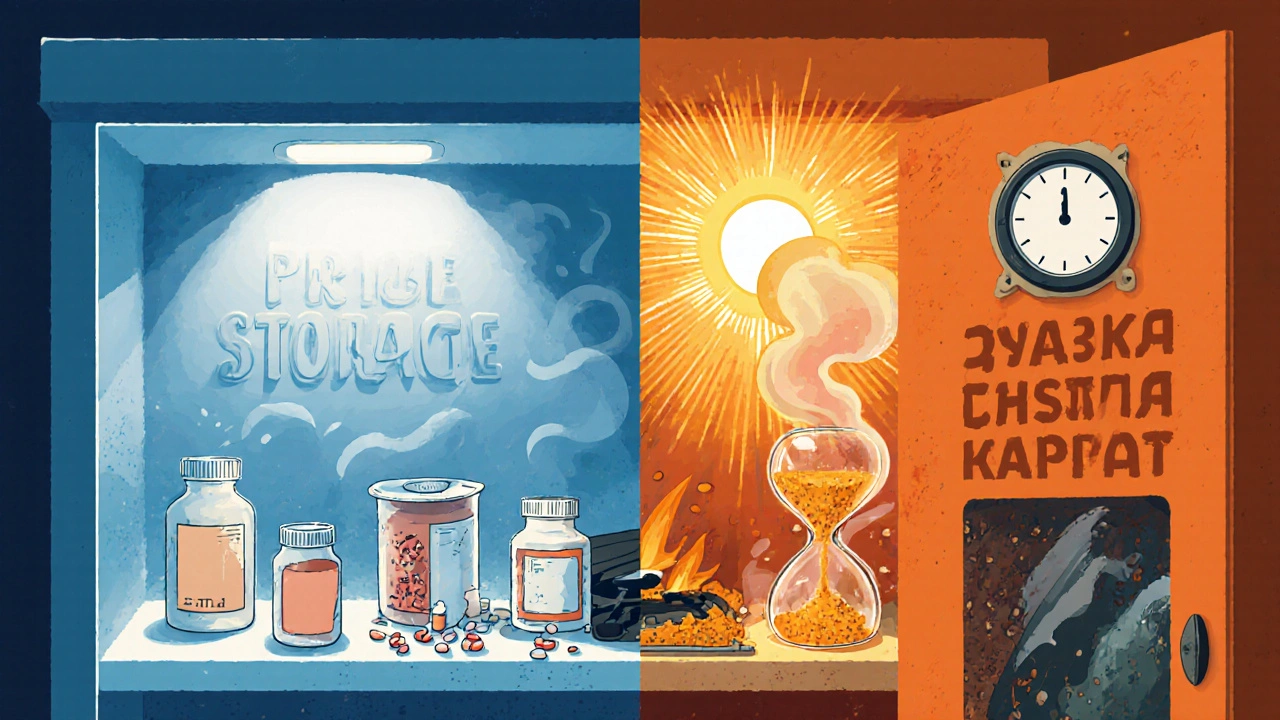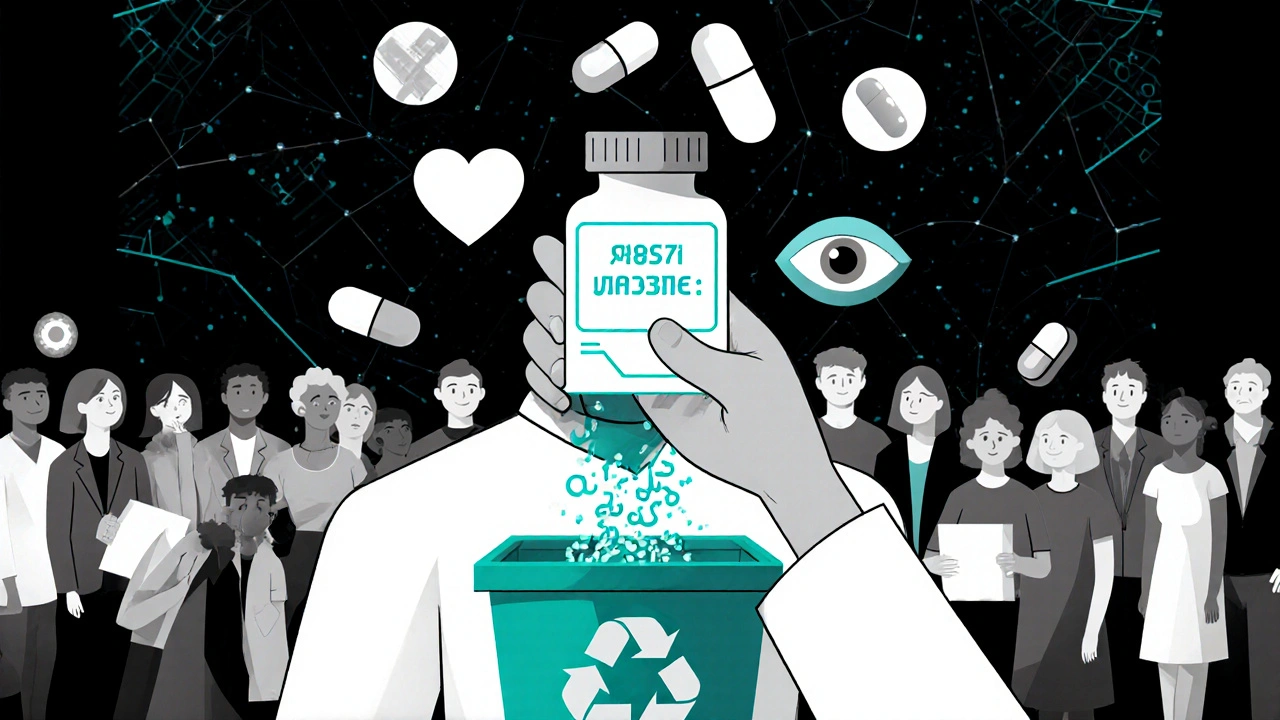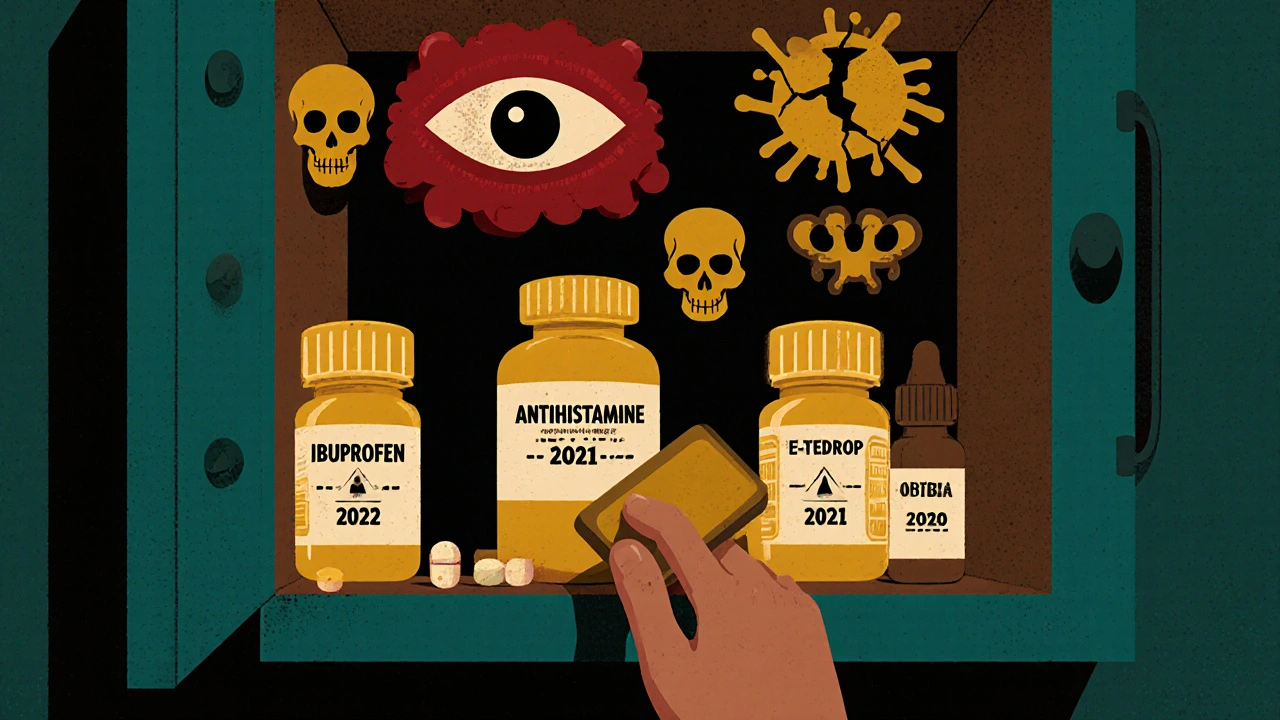Most of us have a drawer or cabinet full of old pills, syrups, and creams with dates that have long passed. You find that bottle of ibuprofen from last winter, or that box of antihistamines from when you had seasonal allergies two years ago. The label says expired, but the pills still look fine. Should you take them? Or is that a dangerous gamble?
What Does an Expiration Date Really Mean?
The expiration date on your OTC meds isn’t just a marketing trick or a way for drug companies to make you buy more. It’s the last day the manufacturer guarantees the medicine will work as expected and stay safe to use. The FDA has required this since 1979, and it’s based on real testing - not guesswork. After that date, they can’t say for sure how strong the medicine still is, or whether it’s broken down into something unpredictable.That doesn’t mean every pill turns toxic the moment the date passes. In fact, most solid medications - like tablets and capsules - stay stable for years after their printed date, especially if they’ve been stored properly. Harvard Medical School tested over 100 common OTC drugs and found that 88% of tablets retained at least 90% of their potency one to two years past expiration. That’s not a fluke. It’s science.
Which Medications Are Safe After Expiration?
Not all meds age the same. Some hold up surprisingly well. Pain relievers like ibuprofen (Advil) and acetaminophen (Tylenol) are among the most reliable. University Hospitals’ lab tests showed these drugs kept 85-90% of their strength up to two years after expiration. If you’ve got a headache or a sore back and the only painkiller you have is three months past its date? It’ll probably still help.Antihistamines like loratadine (Claritin) and cetirizine (Zyrtec) are even tougher. Pharmacy575’s analysis found they maintained full effectiveness for 3 to 5 years beyond expiration when kept dry and cool. That’s why so many people on Reddit and Drugs.com report using expired allergy pills with no issues - as long as they’re not cloudy, smelly, or crumbling.
Even aspirin, often used for heart health, can stay stable for years. But here’s the catch: if you’re taking it daily to prevent a heart attack, you can’t afford to risk reduced potency. A slightly weaker pill might not do the job. In that case, don’t gamble. Replace it.
Which Medications Are Risky After Expiration?
Some meds don’t just lose strength - they become dangerous. Liquid forms are the biggest red flag. Syrups, eye drops, and suspensions can grow bacteria or fungi after expiration. Providence Health’s ophthalmology team found that 72% of expired eye drops developed microbial contamination within three months. Using those can lead to serious eye infections - even blindness in rare cases.Then there’s nitroglycerin. If you have heart disease and rely on this medication for chest pain, an expired tablet could be life-threatening. Studies show it loses 50% of its potency within six months of expiration. That means during a heart attack, you might not get the relief you need.
Antibiotics are another major concern. While most don’t turn poisonous, they can lose effectiveness. That’s not just a problem for you - it’s a public health issue. A weak antibiotic might not kill all the bacteria, leaving behind the toughest strains. Those survive, multiply, and become resistant. That’s how superbugs start. Back in the 1960s, expired tetracycline was linked to kidney damage, and while modern versions are safer, the principle still holds: don’t use old antibiotics.

Storage Matters More Than You Think
Where you keep your meds is just as important as when they were made. Heat, moisture, and light break down medicine faster. The FDA found that storing pills above 30°C (86°F) causes potency loss three times faster than keeping them below 25°C (77°F).Keep your medicines in a cool, dry place - not the bathroom, not the dashboard of your car, and definitely not the kitchen above the stove. The original bottle? That’s your best friend. Once you transfer pills to a pill organizer or a plastic bag, they’re exposed to air and humidity. University Hospitals found that medicines kept in their original sealed containers stayed potent 40% longer than those moved elsewhere.
Look for signs of damage: pills that crumble when you touch them, liquids that look cloudy or have particles floating in them, or anything that smells weird. If your cough syrup smells like vinegar or your aspirin looks yellowed, toss it. That’s not just old - that’s degraded.
What Do Experts Really Say?
There’s a split in the medical world. Some pharmacists, like Kristie Coots from Brevard Health Alliance, say: stick to the date. Always. No exceptions. They argue that even a small drop in potency could matter - especially for people on multiple medications or with chronic conditions.Others, like Dr. Pace from Harvard, take a more practical view: “It may be fine to take an allergy medication that’s a month past its expiration date.” They point out that for minor, short-term issues - a stuffy nose, a headache - the risk is low, and the benefit is real.
The FDA, however, keeps it simple: “Once the expiration date has passed, there is no guarantee the medicine will be safe and effective.” That’s their legal stance. And legally, they’re right. But in real life, people make decisions based on context, not just labels.

What Should You Do?
Here’s a simple rule to follow:- Safe to consider using (if in good condition): Ibuprofen, acetaminophen, antihistamines, some antacids - if expired by a few months, stored properly, and look normal.
- Don’t risk it: Eye drops, insulin, epinephrine, nitroglycerin, antibiotics, liquid suspensions, and any medicine you take daily for a serious condition (like heart disease or epilepsy).
- Always replace: Medications prescribed by a doctor, even if they’re OTC (like daily aspirin for heart protection).
If you’re unsure, ask a pharmacist. They can check the batch, tell you if it’s likely still good, and often give you a free sample if you need a replacement.
How to Dispose of Expired Medications Safely
Don’t flush most pills down the toilet - that pollutes water supplies. Don’t just throw them in the trash where kids or pets might find them.The best way? Mix them with something unappealing - coffee grounds, cat litter, or dirt - seal them in a plastic bag, and toss them in the regular trash. That’s what 87% of pharmacists recommend. For certain controlled substances like opioids, the FDA still advises flushing, but only if no take-back program is available.
Many pharmacies and hospitals now offer free medication take-back bins. Check with your local pharmacy - they’re often quiet and easy to use.
The Bigger Picture
Here’s something surprising: 68% of U.S. households still keep expired meds in their cabinets. That’s over 80 million homes. And it’s costing us money - $765 million a year on replacements for pills that might still work. But it’s also costing lives - $1.2 billion in extra healthcare bills from infections and treatment failures because people used weak or contaminated meds.There’s movement to fix this. The FDA is testing smart packaging that changes color when a drug degrades. The University of Florida is developing tiny sensors that tell you if your aspirin is still good. In five years, your medicine bottle might beep when it’s no longer safe.
Until then, use your head. Don’t fear every expired pill. But don’t ignore the ones that could hurt you. When in doubt, replace it. Your body doesn’t care about the date on the label - it only cares if the medicine works.
Can I take expired ibuprofen or Tylenol?
Yes, if they’re stored properly and look normal - no crumbling, discoloration, or odd smell. Studies show ibuprofen and acetaminophen often retain 85-90% of their potency up to two years past expiration. For occasional use, like a headache or muscle ache, it’s usually fine. But if you’re using them daily for chronic pain or inflammation, replace them. You need full strength.
Is it dangerous to take expired allergy medicine?
Not usually. Antihistamines like Claritin and Zyrtec are very stable. Many users report them working fine even years after expiration, as long as they’re kept dry and cool. If the liquid is cloudy or the pills are sticky, throw them out. But if they look and smell normal, they’re likely still effective. Just don’t rely on them during a severe allergic reaction - always have a fresh epinephrine pen or new pills on hand.
What happens if I take expired antibiotics?
You won’t get poisoned, but you might not get better. Expired antibiotics can lose potency, which means they might kill only the weakest bacteria. The toughest ones survive and multiply, leading to a worse infection - and possibly antibiotic resistance. This is why doctors never recommend using old antibiotics. Always finish a full course of fresh meds, and never share or reuse old prescriptions.
Can expired eye drops cause blindness?
They can. Eye drops are sterile when sealed. Once expired, especially if opened, they can grow bacteria or fungi. Studies show 72% of expired eye drops become contaminated within three months. Using them can cause corneal ulcers, infections, and in rare cases, permanent vision loss. Never use eye drops past their expiration date - even if they look clear.
Should I keep expired medications just in case?
Only if you’re prepared to replace them quickly. For minor issues like occasional headaches or allergies, keeping a few extra pills past their date might be practical - but only if you know how to check for damage and understand the risks. For anything serious - heart meds, asthma inhalers, epinephrine - keep fresh ones. Don’t gamble with your health. A $10 bottle of painkillers isn’t worth risking a trip to the ER.


Holli Yancey
November 17, 2025 AT 08:01I’ve got a bottle of ibuprofen from 2021 sitting in my nightstand-looks fine, no weird smell, still hard as a rock. Took one last week for a headache and it worked just fine. I’m not gonna throw out medicine that still works, especially when it’s just pain relief. The science says it’s mostly safe, and I’m not about to waste money on replacements for stuff that’s perfectly good.
Also, the bathroom cabinet is a death trap for meds. I learned that the hard way after my antihistamines turned sticky. Now everything’s in a sealed jar in the closet. Cool, dry, dark. Works wonders.
Gordon Mcdonough
November 17, 2025 AT 18:12YOU GUYS ARE ALL WRONG!!! EXPIRATION DATES AREN’T SUGGESTIONS THEY’RE LAWS!!! THE GOVT PUT THAT DATE THERE FOR A REASON AND IF YOU’RE TOO LAZY TO BUY NEW PILLS THEN YOU DESERVE WHAT YOU GET!!! I’VE SEEN PEOPLE TAKE OLD ANTIBIOTICS AND THEN COME BACK WITH SUPERBUGS AND NOW WE’RE ALL IN DANGER BECAUSE SOMEONE WAS TOO CHEAP TO REPLACE A $5 BOTTLE!!!
AND DON’T EVEN GET ME STARTED ON THE FACT THAT PEOPLE STORE MEDS IN THE KITCHEN LIKE THEY’RE SPICES!!!
Jessica Healey
November 18, 2025 AT 03:08gordon ugh shut up you sound like a robot from 1998
but honestly? i’ve used expired zyrtec for 3 years and it still knocks me out like it’s new. i keep it in a drawer with silica packets. no cloudiness, no weird texture. if it looks and smells normal, it’s probably fine. i’m not gonna pay $30 every 6 months for allergy pills when my body tells me it still works.
also-eye drops? yeah, toss those. no debate. but ibuprofen? chill.
Levi Hobbs
November 19, 2025 AT 22:55There’s a lot of nuance here, and I appreciate the balanced approach in the original post. The key distinction is between ‘low-risk, low-consequence’ meds and ‘high-risk, life-critical’ ones.
For occasional headaches? Sure, go ahead. But for anything tied to chronic conditions-heart meds, insulin, epinephrine-you’re playing Russian roulette. The data is clear: potency degradation isn’t linear, and some compounds break down unpredictably.
Also, storage is everything. I used to keep my meds in the medicine cabinet until I realized how humid it gets. Now they’re in a sealed container in the bedroom. Big difference.
henry mariono
November 21, 2025 AT 17:25I’ve been using the same bottle of Tylenol since 2020. It’s been in a drawer, away from sunlight. Pills are still white, no cracks, no odor. I’ve taken it twice for migraines and it worked. I’m not reckless-I don’t use it for anything serious. But I also don’t see the point in throwing away perfectly good medicine. The FDA says ‘no guarantee,’ not ‘guaranteed poison.’
Also, the cost of replacing all this stuff adds up. I’m not rich.
Sridhar Suvarna
November 22, 2025 AT 21:03Let us not forget the global perspective. In many developing nations, expired medicines are not a luxury to discard-they are the only option. While safety standards must be upheld, we must also acknowledge that for millions, the choice is between a weak pill and no pill at all.
Perhaps the real issue is not expiration dates, but access. If we could reduce the cost of medicines globally, we would not need to debate whether to take expired ibuprofen.
Still, for those with resources-store properly, replace when uncertain. Wisdom lies in balance.
Kelsey Robertson
November 23, 2025 AT 23:41Oh please. You’re all acting like you’re some kind of medical savants. You think science is just ‘if it looks fine’? That’s how people die. The FDA doesn’t say ‘probably safe’-they say ‘no guarantee.’
And let’s not pretend you’re not just being lazy. You don’t want to go to the pharmacy. You don’t want to pay $8. You want to risk your liver, your eyes, your heart-just so you can feel like a rebel.
And don’t even get me started on the ‘I’ve used it for years’ crowd. You’re not a pioneer-you’re a walking CDC case study waiting to happen.
Joseph Townsend
November 25, 2025 AT 03:09Okay but imagine this: you’re at a music festival, it’s 102 degrees, you’ve got a migraine, and the only thing in your bag is a 2-year-old Advil bottle that’s been bouncing around in your backpack.
You pop one. It works. You live. You thank the medicine gods.
Meanwhile, some guy in a lab coat is crying because you didn’t buy a fresh bottle.
Life isn’t a clinical trial. Sometimes you gotta go with what you got. I’m not saying go full Mad Max and start swallowing antibiotics from 2013-but a little common sense? That’s the real medicine.
Bill Machi
November 26, 2025 AT 07:27There is a clear, documented, peer-reviewed, FDA-backed scientific consensus that expiration dates are conservative estimates based on accelerated stability testing. Most solid pharmaceuticals retain therapeutic potency for years beyond the printed date. The fear-mongering around expired medication is largely driven by pharmaceutical marketing, not medical necessity.
Furthermore, the environmental and economic cost of discarding perfectly viable drugs is staggering. We are literally burning money and polluting landfills because of arbitrary dates designed to maximize profit, not public health.
Let the data speak. Not the fear.
Elia DOnald Maluleke
November 27, 2025 AT 20:47Ah, the modern dilemma: the sacred date versus the silent pill.
We cling to labels as if they are divine scripture, yet we have forgotten the wisdom of our ancestors-who used herbs, roots, and tinctures long before expiration dates were inked onto paper.
The body does not read calendars. It responds to chemistry. And chemistry, when preserved with care, does not betray us.
But let us not be fools: some substances, like liquid eye drops or nitroglycerin, are not to be trifled with. They are not mere pills-they are lifelines.
So let us be wise, not reckless. Let us be informed, not fearful. Let us honor the science, not the sticker.
And when in doubt? Ask the pharmacist. They have seen more expired bottles than you have had hot dinners.